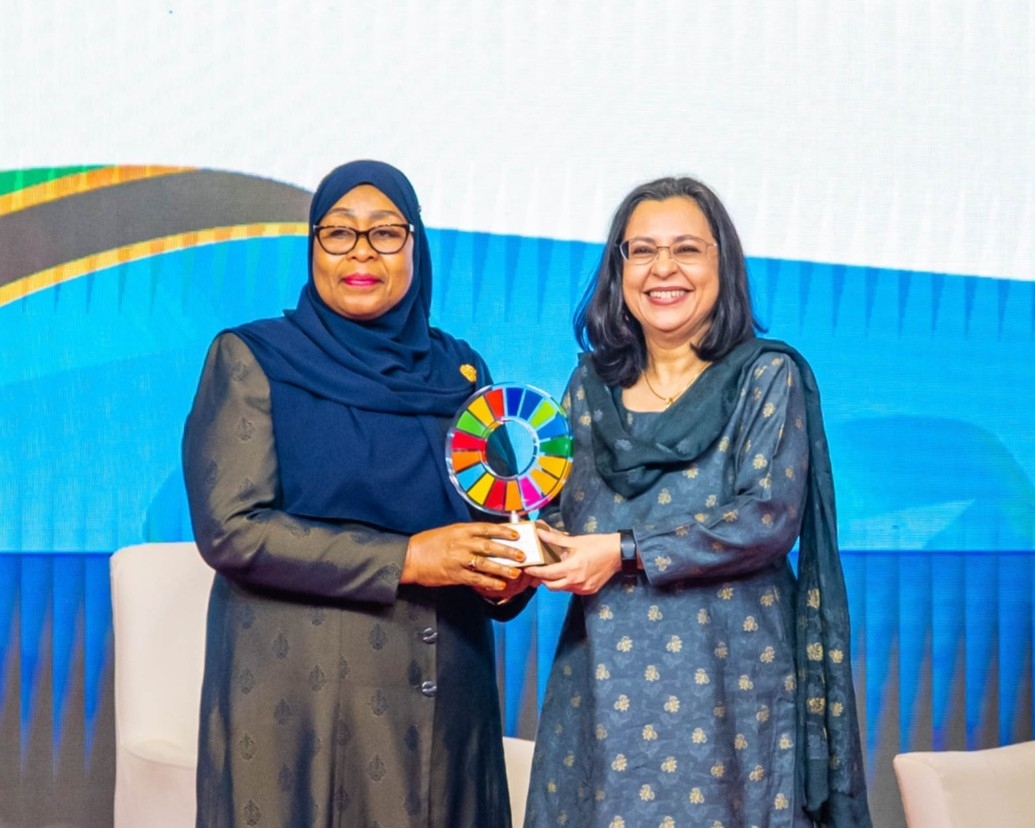
The Africa Academy for Public Health (AAPH) extends its heartfelt congratulations to Her Excellency President Dr. Samia Suluhu Hassan, President of the United Republic of Tanzania, on receiving the prestigious Goalkeepers Award from the Gates Foundation on February 4, 2025, in Dar es Salaam, Tanzania. This award recognizes Tanzania’s remarkable progress in maternal, newborn, child nutrition, and health (MNCNH)—a testament to the country’s commitment to improving health outcomes for women and children.
The award was presented by Dr. Anita Zaidi, President of the Gender Equality Division at the Gates Foundation, during a special ceremony attended by global health leaders, policymakers, and key stakeholders in the maternal and child health space. Speaking after receiving the award, Her Excellency President Dr. Samia Suluhu Hassan reaffirmed the Tanzanian government’s dedication to reducing maternal, newborn, child, and adolescent mortality while strengthening nutrition programs. She dedicated the award to healthcare workers and emphasized that reducing mortality in these vulnerable populations remains central to Tanzania’s development agenda.
Panel Discussion on Maternal, Newborn, Child and Adolescent Health in Tanzania.
As part of the event, a high-level panel discussion titled “Maternal and Child Health in Tanzania: Recent Progress and Opportunities for Action” was moderated by Dr. Rasa Izabnegahdar, Director of Maternal, Newborn, Child Nutrition, and Health at the Gates Foundation. The discussion featured leading experts in the field, including Dr. Ahmad Makuwani, Director of the Division of Reproductive, Maternal, and Child Health at the Ministry of Health, United Republic of Tanzania; Dr. Sunday Dominico, Program Director at Thamini Uhai & President-elect of AGOTA; and Dr. Mary Mwanyika Sando, CEO at Africa Academy for Public Health & President-elect of MEWATA.
Dr. Makuwani reflected on his pivotal role in advancing maternal health, drawing from his experiences since 2018. Recognizing the crucial role of political will, he spearheaded the "Jiongeze, Tuwavushe Salama" campaign, which significantly reduced maternal and newborn deaths by improving access to essential maternal and newborn healthcare services. The initiative aimed to achieve at least 80% of the population having a health facility within a 5 km radius. He emphasized that the campaign's success was driven by the innovative and strategic use of limited resources; maximizing efficiency to safeguard the lives of mothers and newborns.
Dr. Sunday highlighted three key factors behind the success of the 13-year maternal health program in Kigoma, Tanzania (2006–2019). First, political will through policy reforms played a crucial role, with government commitment reflected in strategic documents like the National Development Vision 2025, which aimed for a 75% reduction in maternal mortality, and the National Accelerated Plan for the Reduction of Maternal Mortality, which served as the program’s guiding framework. Second, scaling up emergency obstetric care services decentralized life-saving services from high-level hospitals to local health centers, contributing to a 43% decline in maternal and neonatal deaths in Kigoma. Lastly, he stated the importance of robust monitoring and evaluation, ensuring continuous progress tracking and effective implementation.
Dr. Mary Mwanyika Sando underscored the critical role of local context in shaping health priorities and policies, emphasizing that locally generated evidence is essential for addressing country-specific challenges. She noted that health challenges in Tanzania may differ from those in other parts of the world, meaning that the feasibility and adoption of solutions must also vary accordingly.
She shared that for over 40 years, the standard of care across many countries has been that all pregnant women receive a daily iron and folic acid. However, clinical trials, including those conducted here in Tanzania, have demonstrated that Multiple Micronutrient Supplementation (MMS), which includes iron and folic acid (IFA) plus 13 other essential micronutrients, are superior to iron and folic acid in terms of reducing stillbirths, preterm birth and low birthweight. Building off this, AAPH as part of a consortium led by Tanzania Food and Nutrition Centre (TFNC) and UNICEF recently concluded an implementation science project in Mbeya Region to learn how MMS can be integrated into the routine ANC services in place of IFA. Stakeholder engagement with government leadership is ongoing to make use of this project’s promising results in developing a roadmap towards this change. Scaling up this intervention, which has, has the potential to save many lives in Tanzania.
Citing an example from the WHO’s recommendations on calcium supplementation during pregnancy, she explained that high costs, dosage complexities, and logistical challenges have made full implementation of this life-saving intervention difficult in many countries, including Tanzania. However, research conducted in Tanzania—by scientists from the Africa Academy for Public Health (AAPH), Ifakara Health Institute (IHI), and Muhimbili University of Health and Allied Sciences (MUHAS), in collaboration with Harvard University—has provided a locally viable solution.
The study demonstrated that a single low dose of 500mg of calcium daily is just as effective as the WHO-recommended 1500mg regimen in preventing preeclampsia and preterm birth. This homegrown evidence is now being considered for policy adoption to improve maternal health outcomes in Tanzania.
A Milestone for Tanzania and a Call for Continued Action.
Tanzania’s recognition at The Goalkeepers Award Ceremony by the Gates Foundation marks an important milestone in the country’s ongoing journey toward improving maternal and child health outcomes. The success achieved so far reflects the collaborative efforts of the government, healthcare facilities, academic institutions, research organizations, and development partners working to create lasting change.
AAPH is proud to contribute through innovative research and evidence-based advocacy, supporting Tanzania’s efforts in maternal and child health advancements. Once again, we congratulate Her Excellency President Dr. Samia Suluhu Hassan, President of the United Republic of Tanzania on this well-deserved honor and look forward to continued collaboration in advancing Tanzania’s public health agenda.
#ForBetterPublicHealth
